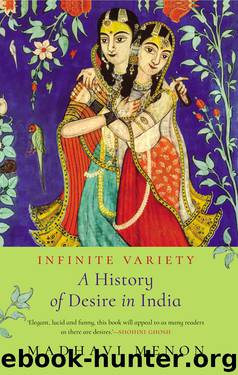Infinite Variety: A History of Desire in India by Madhavi Menon

Author:Madhavi Menon [Menon, Madhavi]
Language: eng
Format: epub, azw3
ISBN: 9789387693241
Published: 2018-05-09T22:00:00+00:00
11
ARMY
We lead by example, live by chance, love by choice and kill by profession.
—One of many slogans of the Indian Army
In the 4th century BCE, the Greeks made what we today call illicit desire the basis of selection to their armies. The Sacred Band of Thebes, for instance, was an army regiment made up entirely of male lovers and beloveds (150 couples; 300 men in all) in the belief that the erotic bond among soldiers would make them valiant. It was assumed that lovers would more easily lay down their lives for the ones they love. Each lover would want to appear strong in the eyes of his beloved and would thus fight harder in order to defeat the enemy. And indeed, this was the case. The troop of handpicked male lovers rose to the rank of the elite in the Theban army, with the defeat of Sparta in 371 BCE marking their most famous victory.
Plato echoes this belief in the Symposium when Alcibiades asserts that his would-be lover Socrates saved his life during a military campaign. The samurai in Japan too were bound together as early as the 11th century CE by sexual relationships between the older and younger members of the warrior class. From the ancient Greeks to the medieval Japanese, war and same-sex desire have been seen as coterminous rather than contradictory. In our own time, however, the relation between war and homosexuality has been considered to be utterly antagonistic. So much so that in the 20th and 21st centuries, most Western countries, and almost all post-colonial countries once ruled by the West, prohibited homosexuals from serving openly in the military. The most well-known example of this prohibition was the infamous ‘Don’t Ask, Don’t Tell’ policy in the US Military (repealed in 2011) in which gay soldiers were told they could continue to serve only on condition that they never speak about or act on their desires while in the military. There was a zero-tolerance policy for any gay member of the military who violated this rule. An immediate discharge would be the consequence of any self-disclosure of a homosexual person’s sexuality.
What is interesting about these tales spread across space and time is not whether homosexuals or heterosexuals make better soldiers. Rather, what is fascinating is that the military, which for many people represents the antithesis of romance, is actually an organization that thinks deeply about the question of desire. Despite appearing to disavow sex, the army (and navy and air force) actually has to grapple with it not only on a daily basis, but also in the very fabric of its policies and procedures. The army, it would be no exaggeration to say, is built on desire.
Consider, for a moment, the roster for a tour of duty of a soldier in the Indian army. Typically, an officer or soldier is posted for 2 to 3 years to a field station followed by a similar duration of a peace posting. Families cannot be accommodated in postings located in combat zones.
Download
Infinite Variety: A History of Desire in India by Madhavi Menon.azw3
This site does not store any files on its server. We only index and link to content provided by other sites. Please contact the content providers to delete copyright contents if any and email us, we'll remove relevant links or contents immediately.
Cecilia; Or, Memoirs of an Heiress — Volume 1 by Fanny Burney(32558)
The Great Music City by Andrea Baker(32019)
Cecilia; Or, Memoirs of an Heiress — Volume 2 by Fanny Burney(31956)
Cecilia; Or, Memoirs of an Heiress — Volume 3 by Fanny Burney(31942)
We're Going to Need More Wine by Gabrielle Union(19046)
All the Missing Girls by Megan Miranda(16029)
Pimp by Iceberg Slim(14508)
For the Love of Europe by Rick Steves(14121)
Bombshells: Glamour Girls of a Lifetime by Sullivan Steve(14076)
Talking to Strangers by Malcolm Gladwell(13370)
Norse Mythology by Gaiman Neil(13365)
Fifty Shades Freed by E L James(13241)
Mindhunter: Inside the FBI's Elite Serial Crime Unit by John E. Douglas & Mark Olshaker(9343)
Crazy Rich Asians by Kevin Kwan(9292)
The Lost Art of Listening by Michael P. Nichols(7506)
Enlightenment Now: The Case for Reason, Science, Humanism, and Progress by Steven Pinker(7313)
The Four Agreements by Don Miguel Ruiz(6765)
Bad Blood by John Carreyrou(6621)
Weapons of Math Destruction by Cathy O'Neil(6280)
